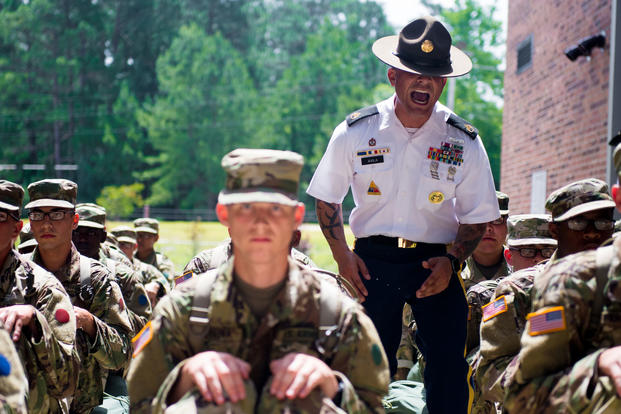The U.S. Army's top enlisted official today said the service is considering extending the time trainees spend in Basic Combat Training.
Sgt. Major of the Army Daniel Dailey told reporters at the Pentagon that the Army will use what it learns from a new pilot that adds two months to infantry one station unit training, or OSUT, to make a decision whether to extend BCT.
"This is not an emergency response to anything; it's something that we have been looking at for a long time," Dailey said.
Beginning July 13, trainers at Fort Benning, Georgia will begin a pilot that extends the 14-week infantry OSUT to 22 weeks. Infantry trainees will receive more instruction and practice on infantry skills such as land navigation, marksmanship, hand-to-hand combat, fire and maneuver and first aid training.
The pilot will run until mid-December. Once the program is finalized, Benning officials said they hope to start implementing the 22-week cycle across infantry OSUT in October 2019.
"That will tell us a lot of things -- what are the time and the tasks that we need to expand," Dailey said. "We have already got a large menu of things that we want to get after; we have known that for some time."
The pilot will also help the Army make a decision about extending BCT, Dailey said.
The Army recently redesigned of Basic Combat Training to instill more discipline and pride in young soldiers after leaders from around the Army complained that new soldiers were displaying a lack of obedience, poor work ethic and low discipline.
"We have packed a lot into basic training, and we need to extend it," Dailey said. "We know we can make a better product if we make it longer.
"We want to get our soldiers more capable. We want to give units receiving these young men and women a better product."
But extending BCT isn't something that should be rushed, Dailey said, explaining that the service is in the process of growing end strength.
The Army's fiscal 2019 budget requested 4,000 soldiers, which will boost the number of active-duty soldiers from 483,500 to 487,500.
To extend BCT under these circumstances, "you've got to grow the training capacity," Dailey said. "Because you reduce the total number of training seats when you extend basic training over time, so we have to synchronize this with the other efforts ongoing in the Army."
"We got to make sure we can do it proportionally; we've got to build our end strength over time," Dailey added.
Once the infantry OSUT pilot is complete, Fort Benning officials will seek feedback from the units on how the new soldiers who participated in the pilot perform compared to those who take the standard 14-week course.
"That pilot will inform us to be able to make decisions about much more in the future -- whether that be to extend [training for] other combat-arms MOSs, whether that be to inform the chain of command to extend basic training -- that will be part of the outcome of the pilot," Dailey said.
"Basic training has served us quite well, but we can do better."
Matthew Cox can be reached at matthew.cox@military.com.











